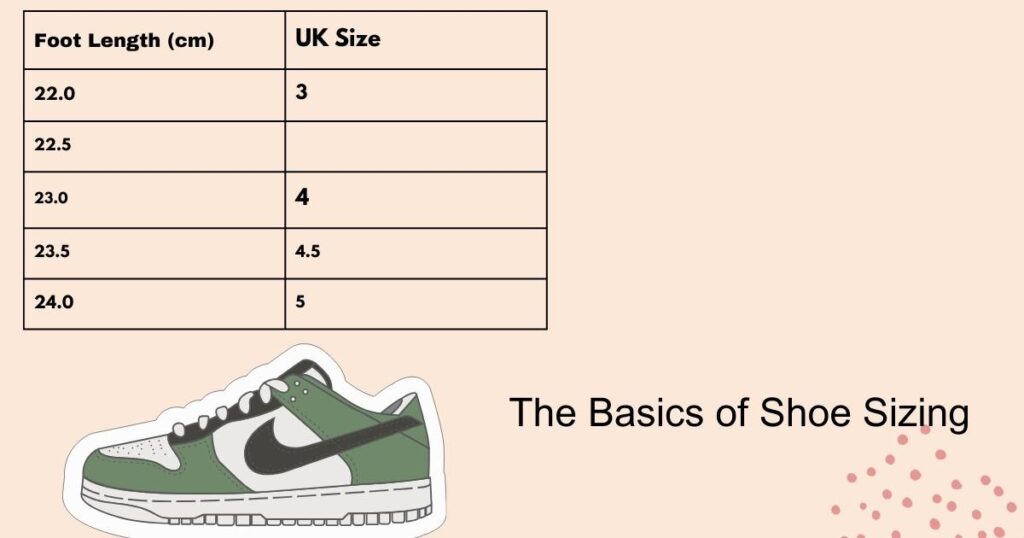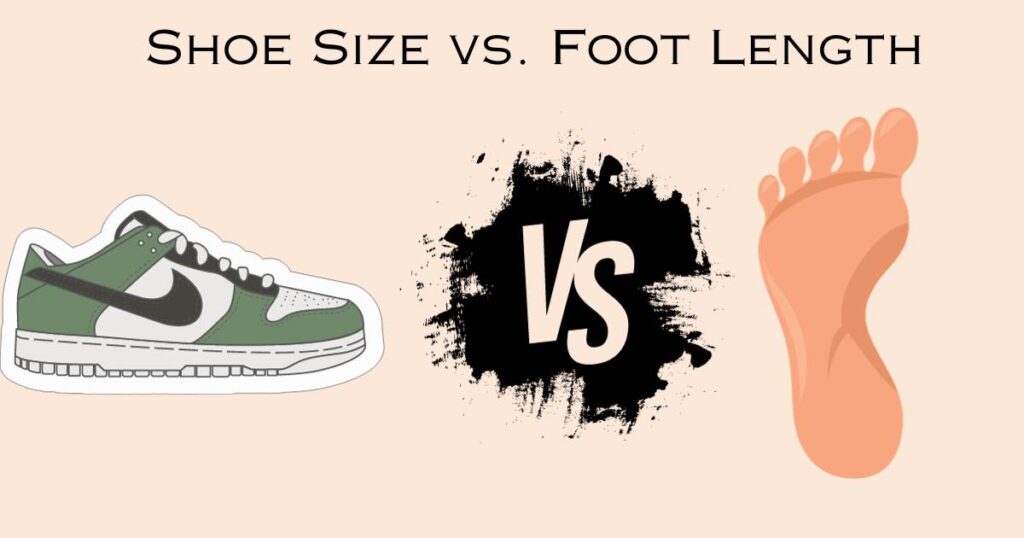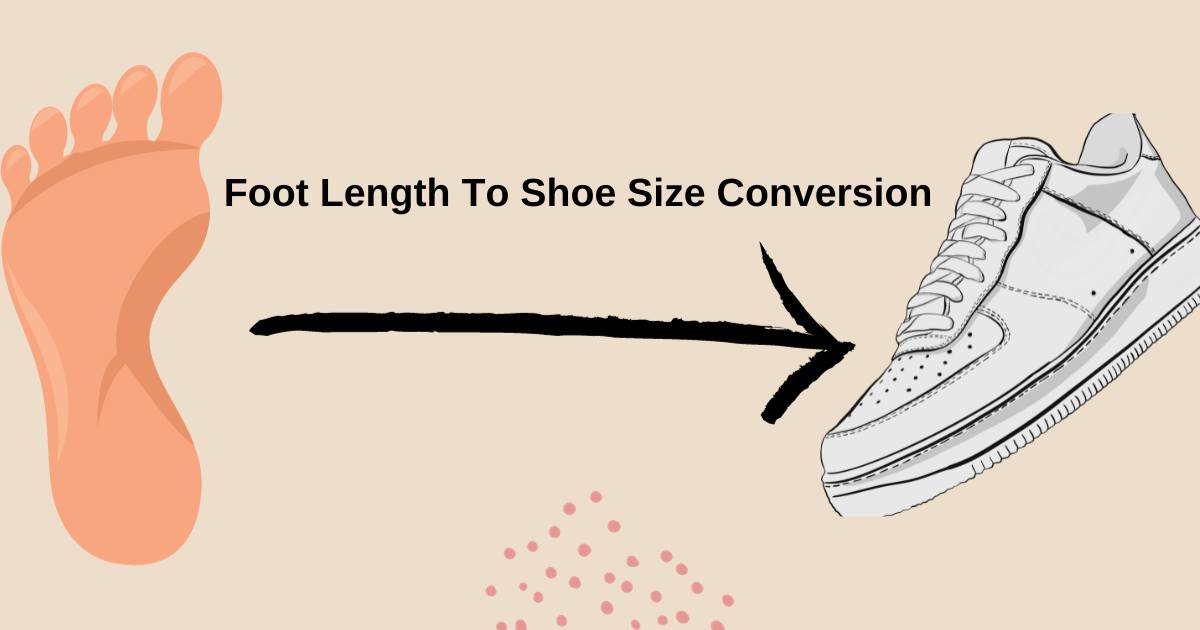Ever felt the frustration of ordering shoes online and having them arrive in the wrong size? Let’s end that shoe-size shuffle!
Our expertly researched guide is your go-to for unraveling the mystery of foot length to shoe size conversion. Whether you’re a style-savvy woman, a laid-back man, a parent of toddlers, or cherishing a baby’s first steps, our comprehensive research has got you covered. Say goodbye to the confusion, and hello to comfy steps that fit just right. We’ve delved deep into the science of sizing, ensuring that every word here is your authority on finding the perfect fit. Let’s dive into the magic of finding your perfect shoe size – easy, breezy, and tailored to your unique stride!
Your Foot and Finding the Perfect Fit
Why Your Foot Size Matters in Shoe Fitting
Getting the right shoe size isn’t just about feeling good; it’s crucial for keeping your feet happy and healthy. Too-small shoes can lead to cramps and blisters, while oversized ones can cause trips and discomfort. Understanding your foot’s unique shape is the key to finding comfy shoes. Everyone’s feet are different, so it’s essential to measure not just the length but also the width and arch. This helps you pick shoes that hug your feet just right, preventing problems down the road and making sure you’re not just looking good but feeling good too.
How to Nail Accurate Foot Length To Shoe Size
Making sure your shoes fit perfectly is like solving a puzzle. You’ve got to convert your foot length into the right shoe size, whether it’s in the U.S., UK, or EU system. This step is super important because shoes that don’t match your foot size can lead to some serious issues. Imagine wearing shoes that throw off your balance or hurt your joints. Not fun, right? This is especially true for little feet that are growing fast. So, take a little time to figure out your foot-to-size conversion—it’s the secret to choosing shoes that give your feet the love and support they deserve.
Understanding Foot Measurements
How to Measure Foot Length Accurately:
Let’s make measuring your feet super easy! Find a flat floor and put a big piece of paper against the wall. Stand with your heel against the wall and your foot flat on the paper. Use a pencil to trace around your foot, keeping the pen straight up and down. Now, grab a ruler or tape measure to measure from the back of your heel to the tip of your longest toe. Do this for both feet and write down the numbers in inches and centimeters. Easy, right?
Tools Needed for Accurate Measurements:
You only need a few things for this. Grab a ruler or tape measure to check the length of your foot. Make sure it’s straight and easy to read. A simple pen or pencil will do the tracing job perfectly. Having these basics will make sure you get the most accurate foot measurements.
Tips for Getting the Most Precise Measurements:
Let’s not forget about the width! Measure the widest part of your foot and note it down. Oh, and here’s a tip: measure both feet! Sometimes, one foot is a bit bigger, and you want your shoes to be comfy on the larger one. So, measure away and get ready to find the perfect-fitting shoes!
The Basics of Shoe Sizing

Decoding Sizing (U.S., UK, EU, etc.)
Picture this: shoe sizes are like languages, and the U.S., UK, and EU each have their unique way of expressing it. In the U.S., it’s often in inches or centimeters; the UK prefers numbers, while the EU opts for the metric system. But here’s the trick: a size 8 in the U.S. doesn’t always dance the same as a UK size 8. So, when shopping globally, check conversion charts to ensure your feet are speaking the right size dialect.
Brand Sizing Adventures
Ever noticed that a size 8 from one brand can feel like Cinderella’s slipper, but from another, it’s more like a wicked stepsister’s squeeze? Welcome to the world of brand variations. Different brands have their sizing secrets, influenced by shoe design, materials, and who they think their audience is. Tip: Before hitting that ‘buy now’ button online, check out customer reviews for insights into a brand’s sizing quirks.
Half Sizes: The Sweet Spot
Imagine you’re a size 8.5 stuck in a size 8 world. Half sizes are like the magical solution to this problem. They’re the bridge between sizes, offering a more customized fit. Choosing a half size ensures your shoes are neither too tight nor too loose, hitting that sweet spot of comfort. It’s like the Goldilocks of shoe sizing – just right! So, when you see that half-size option, embrace it. Your feet will thank you for the comfort dance!
Creating detailed charts in a text format can be challenging due to the limitations of this medium. However, I can provide you with a simple text representation of a foot length to shoe size conversion chart for U.S. Women’s, Men’s, and Toddler sizes, UK sizes, EU sizes, and Baby shoe sizes. Keep in mind that these are general guidelines, and actual sizes may vary between brands. It’s always best to refer to the specific size chart provided by the manufacturer.
Foot Length To Shoe Size Conversion Chart:
U.S. Women’s Sizes:
| Foot Length (inches) | U.S. Women’s Size |
|---|---|
| 8.0 | 5 |
| 8.5 | 5.5 |
| 8.75 | 6 |
| 9.0 | 6.5 |
| 9.125 | 7 |
U.S. Men’s Sizes:
| Foot Length (inches) | U.S. Men’s Size |
|---|---|
| 9.25 | 7 |
| 9.5 | 7.5 |
| 9.625 | 8 |
| 9.75 | 8.5 |
| 10.0 | 9 |
U.S. Toddler Sizes:
| Foot Length (inches) | U.S. Toddler Size |
|---|---|
| 4.0 | 5 |
| 4.5 | 6 |
| 5.0 | 7 |
| 5.25 | 8 |
| 5.5 | 9 |
UK Sizes:
| Foot Length (cm) | UK Size |
|---|---|
| 22.0 | 3 |
| 22.5 | 3.5 |
| 23.0 | 4 |
| 23.5 | 4.5 |
| 24.0 | 5 |
EU Sizes:
| Foot Length (cm) | EU Size |
|---|---|
| 36.0 | 36 |
| 36.5 | 36.5 |
| 37.0 | 37 |
| 37.5 | 37.5 |
| 38.0 | 38 |
Baby Shoe Size Conversion:
| Foot Length (inches) | Baby Shoe Size |
|---|---|
| 3.5 | 0 |
| 4.0 | 1 |
| 4.5 | 2 |
| 5.0 | 3 |
| 5.5 | 4 |
These charts provide a general idea of the conversion between foot length and shoe sizes for various sizing systems. Always check with the specific brand’s size chart for the most accurate sizing information.
Special Considerations
Kids’ Shoes and Size Magic
When it comes to kiddos’ kicks, finding the right size is like doing a little size magic dance. Kids’ feet grow faster than you can say “candy,” so measuring their foot length is the secret spell. But here’s the trick: check the brand’s size chart because they all have their own magic codes. And remember, leave a smidge of extra room for growth – they’re little wizards in the making!
Sneakers, Fancy Shoes, and Everything In-between
Sneakers, fancy shoes, and those in-between buddies have their own secret club of sizes. Sneakers might have a different handshake, so peek at the brand’s size chart for the password. Fancy shoes? Well, they’re the cool kids with a unique sizing rulebook. The tip here? Try on a few styles, because you never know which one will be the perfect fit for your feet’s adventure.
Wide or Narrow, Find Your Cinderella Fit
Got wide or narrow feet? No worries – there’s a perfect Cinderella fit for every foot! Wide feet? Look for shoes with a ‘wide’ tag – they’re like comfy castles for your feet. And if you’re the owner of narrow feet, lean towards brands that run a bit slimmer. Always check size charts that spill the width beans, and don’t be shy about trying on shoes.
Common Mistakes to Avoid
Assuming Consistency Across Brands
Many people think all shoe sizes are the same, no matter the brand. But that’s a big mistake! Different shoe companies have their own sizing rules. A size 8 in one brand might feel totally different than a size 8 in another. So, always check the size chart of the brand you’re buying. Also, peek at customer reviews – they spill the beans on whether a brand’s shoes tend to run big or small.
Ignoring Half Sizes When Needed
Here’s a simple truth: feet come in all shapes and sizes. If your feet don’t fit perfectly into standard sizes, don’t ignore the magic of half sizes. They exist for a reason! Choosing a half-size up or down can make your shoes feel like they were made just for you, preventing discomfort and those dreaded blisters. Don’t underestimate the power of finding your perfect half-size.
Not Factoring in Foot Width
Feet aren’t one-size-fits-all, and neither are shoes. It’s not just about length; it’s about width too! Some people have wider or narrower feet than others. Lucky for us, many shoe brands offer different width options – like narrow, regular, and wide. Forgetting about foot width can lead to shoes feeling too tight, causing discomfort and possible foot problems. Always check if a brand offers width options and pick the one that matches your foot width.
Shoe Size vs. Foot Length

Unlocking the Mystery of Foot Length and Shoe Size
Have you ever wondered how your foot length translates into finding the perfect shoe size? It’s like matching pieces of a puzzle for a comfy fit. Imagine your foot as a map, and the shoe size as the destination—it’s all about making that perfect connection. However, keep in mind that different shoe brands have their own language when it comes to sizes. Some might speak a bit larger, others a bit smaller. So, always pay attention to brand-specific guides and, if possible, try before you buy to ensure your shoes hug your feet just right.
Navigating Toddler and Baby Shoe Sizes
Now, when we talk about those adorable little feet of toddlers and babies, the game changes a bit. Their feet are on a speedy adventure of growth, and choosing the right shoe involves more than just length. It’s like picking shoes that speak the language of tiny toes—considering width, flexibility, and the exciting stages of development. Toddler and baby shoes even come with age indicators, helping parents select the best pair for each little milestone. So, when you’re on a baby shoe shopping spree, think beyond length to ensure those tiny steps are as comfy as can be.
Using Online Calculators for Stress-Free Sizing
Imagine a digital fairy godmother helping you find the right shoe size effortlessly. Online shoe size calculators do just that! They’re like your personal shoe-sizing sidekick, making sense of the sizing chaos. With a few clicks, you input your foot measurements, and voilà—precise recommendations pop up, considering different sizing systems or even international shoe adventures. These digital wizards simplify your online shoe shopping, making it a breeze to pick the right size without a hitch. Just remember, while they’re handy, it’s still a good idea to peek at brand charts and customer reviews for the full story.
Conclusion
Hey savvy shoppers! So, we’ve dished out the deets on measuring your feet like a pro – it’s the secret sauce to finding shoes that feel as good as they look. Whether you’re eyeing U.S., UK, or EU sizes, or picking out kicks for the kiddos, we’ve got you covered. Wave goodbye to size confusion by sidestepping common blunders, and remember, online shoppers, consult those size charts, dive into reviews, and be in the know about returns. Tiny tots in the mix? No problem – use those nifty online calculators. Bottom line: measure those tootsies, snag the perfect pair, and let your feet do a happy dance.
To measure your foot length at home, grab a ruler or tape measure. Place it against a flat surface, then stand on it with your heel against the wall. Measure from the back of your heel to the tip of your longest toe. Don’t forget to measure both feet and use the larger measurement.
Unfortunately, no. Sizing can vary between brands due to differences in lasts (the molds used to create shoes). Always check the brand’s size chart, read reviews for insights, and if possible, try on shoes in-store before purchasing.
The primary difference lies in width. Women’s shoes are typically narrower than men’s. Also, the numerical size for women’s shoes is usually about 1.5 sizes smaller than men’s. For example, a woman’s size 8 is roughly equivalent to a man’s size 6.5.


